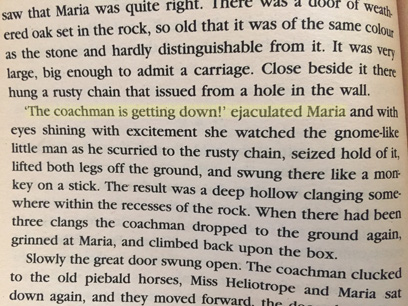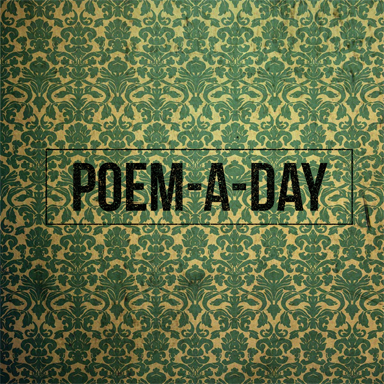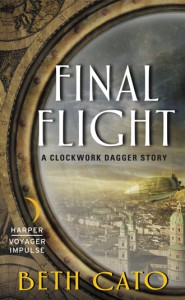“Etymology Is Important,” She Ejaculated
I’m going to start off by telling a story from when I was 13 or 14 years old. I was with my mom and grandma in the car as we drove through the Central California countryside after a Sunday visit to my uncle’s church. As is often the case, then and now, I was reading a new book.
“Mom,” I asked, “What does ‘ejaculate’ mean?”
My Mom and Grandma shared a look in the front seat. “Beth, what are you reading?” There was a strange strain to her voice.
“This book called The Little White Horse by Elizabeth Goudge.” I held up the cover so she could see it in the mirror.
Mom and Grandma glanced at each other again. “Read the line to me,” Mom asked.
 “‘The coachman is getting down,’ ejaculated Maria.'”
“‘The coachman is getting down,’ ejaculated Maria.'”
Mom and Grandma both belted out nervous laughs. “Oh. Is it an old book?” she asked. I confirmed that it was a reprint of an old book, and I was informed I’d be told about other definitions for the word once we arrived home.
Yeah, that was a fun conversation. I was both mortified and amused. I had given them quite a fright with my choice of reading material on the way home from church! (I do recommend The Little White Horse–it’s a lovely gothic middle grade book, and apparently has gained new attention in recent years as it’s one of J.K. Rowling’s childhood favorites.)
Etymology is the history of a word, the how, when, and where of its use. I write historical fiction novels, and I find myself very aware of the words I choose. I cannot be 100% accurate to period, nor do I want to be. I will not have my characters ejaculate their speech, no matter how appropriate that word usage may have been in their time!
It’s all about balance. I want my books to be as easy to read as other current books–with contemporary concepts of paragraph size, dialogue tags, etcetera–while still keeping readers in a distant world.
I frequently check word etymologies as I write and revise. My usual go-to is the Online Etymology Dictionary; if that site doesn’t list the word, I usually resort to a Google search of “etymology [word].
There is also the dilemma of a word seeming contemporary, even though it’s not. This is referred to as “The Tiffany Problem”, named so because Tiffany is a legitimate medieval name but it looks too modern to readers of historical fiction and fantasy. For matters like that, it’s great to get feedback from other readers during early revision stages.
Sometimes, I consciously stay with an anachronistic word. For example, the word “kid” for “child” is a very recent development in the English language.
I also use the word “Reiki” to describe a form of magical healing, though Reiki as a modern practice didn’t start in Japan until the 1920s. On an additional note, my copyeditor for Breath of Earth suggested capitalizing Reiki–that’s what it said in their style guide–so I went with that in the final book. It gives it more gravitas in my 1906 setting.
Word choice does determine the tone. Within a sentence, a writer can establish the setting, time, and point of view. Be choosy. Be cautious. And be aware of what “ejaculate” means in various contexts.
Reposted from Novelocity.
Read More
Shut Up! Times When It’s Imperative You DO NOT Share Happy Writing News
Writing is hard. Revising is hard. The submission cycle is downright depressing. Querying agents? It sucks away your soul, email by email.
That means that it’s especially hard to contain yourself when good news comes at last. It’s tempting to scream to the world–in reality and in all caps–that the story finally sold! That an agent wants your full manuscript! That a publisher wants your book!
DON’T. Take your hands off the keyboard. Step away from your phone. Maybe tell a few select people, but don’t you dare announce your good news in the early stages. Speaking out too soon shows that you’re unprofessional and unable to keep a secret. You may very well sabotage the deal you’re so happy about. Google is the biggest tattle-tale in the world, you know. Editors and agents will follow your social media and blog, and not in a creepy way, either. If they are taking the time to look you up, that’s a great thing. They want to know you! You’re establishing an important business relationship.
You want that relationship, too. So here are the moments when you need to sit on your hands.
– A story acceptance
It’s awesome to get that initial acceptance email, but the deal isn’t real until there is a double-signed contract. That makes it legally binding. Even then, sometimes a publisher will ask you to refrain from public mention for a while; for example, this might happen if they are still sending out rejections for that particular issue. Respect that request.
– The contract is signed but the work hasn’t been published after months of wait OR you didn’t get paid when it was published OR your story was revised without your permission, etc.
Sometimes, even after a contract is signed, a deal might fall apart. Maybe the editor pulls a jerk move, or editors change and the new one doesn’t want your work, or the publication dies, or your reminders about payment get no reply. This puts you in a delicate position because you have a valid right to complain. Don’t do that in public as step one, though. You want to build your case. Query the editor, if you can. Query more than once over a period of time. Go onto password-protected writer forums and find out if there are other writers in the same position as you. You want allies! Maybe together, you can make yourselves heard, either through email or as a united front on social media. If you’re a member of SFWA, Griefcom is a valuable resource with professionals who will intercede on your behalf.
– An agent has rejected your manuscript OR requests a partial or full manuscript OR wants to call you
Querying agents is a long, difficult, demoralizing process, but it’s not one to be discussed in public. Why? Agents NEED to check you out online. You don’t want them to know they’re the 73rd agent you’ve queried, or that you’ve been querying this book for three years. More than likely, you’re querying a bunch of agents at the same time (as one should, unless you offered an exclusive; it would take forever to query one by one). You want all of those agents to think they are your top choice. You want to appear professional yet also personable. Throughout various stages of the publishing process, you need to be able to keep a secret. If you’re a blabbermouth, well, will they want to work with you?
You DO need a safe place to vent or celebrate through the querying process, though. Find a password-protected private place to do that. I used Agent Query back in the day, but there are various other writer forums or private Facebook groups where you can safely chronicle your journey.
– An agent offers representation
Again, this is a test of how you can keep a secret, but it’s also a show of respect for other agents who may be considering your work. You likely have queries out with multiple agencies. When you get an offer, don’t say ‘yes’ right away, no matter how tempting; ask for a period of time like a week or two so that you can send notice to other agents to give them a chance to respond. You suddenly look a lot more appealing once you have an offer on the table. Other agents will likely want to push your query/manuscript to the top of their pile so they can find out what the fuss is all about. You might get more requests for the full manuscript or other offers of rep.
Again, share this joy in a private setting online. Don’t liveblog it, or you’ll look tactless and rude to other agents. Again: until the contract is signed with an agent, it’s not a done deal. Don’t sabotage yourself.
– An editor makes an offer for your book
This is the most aggravating secret in the world, but you dare not say a thing until the proper time. And that proper time may be a long time coming. Contract negotiations may take months with a major publisher–maybe even six months or more. If you speak out before the deal is done, you will look very, very bad.
There’s an extra level of aggravation here, too. Even after the paperwork is signed, you still need to keep every mum for a little while longer. Most large-publisher book deals aren’t official-official until they are in Publishers’ Marketplace. Most writers don’t subscribe to that because it’s expensive, but a friend may scream the news to you online (that’s how I knew I could announce my first deal at long last–a friend told me on Twitter!) or your agent can give you the head’s up.
At that point, mash down the capslock and scream the news to the world. YOU HAVE A BOOK DEAL!!!!!!!!
Reposted from Novelocity.
Goodreads Book Giveaway
4 Ways to Affordably Acquire Historical Research Books
When you’re engaged in historical research, web pages often are not the best sources: old-fashioned books are. But how do you find the right books? How do you acquire them? How do you afford them?
– Use Wikipedia, but scroll down.
Sure, Wikipedia can provide a decent synopsis of a subject, but the most useful information is in the footnotes at the bottom of the page. That’s where you find cited data, such as book titles and theses. Follow the links and you might even find the materials online for free!
– Libraries still exist.
Shocking, isn’t it? You can go to physical libraries and get books for merely flashing a library card. Look into inter-library loans or see if you can access college libraries nearby. Librarians are available to help you out, too.
– Buy used books.
This is my preferred method of research, simply because I like to hold onto content for future reference. My favorite shop is Better World Books because the shipping is free, the selection is great, and my purchases benefit charities. I also look for used books on Amazon and Half.com.
– Find free ebook archives.
Most people know about places like Project Gutenberg and its efforts to digitize old books, but it’s not the only such resource. State and city governments and museums are also creating more online archives. For example, check out the California Digital Newspaper Collection created by UC Riverside or Washington State’s Online Library of classical state literature ranging from pioneer biographies to native tales or the San Francisco Library’s 1906 earthquake photograph collection. Savoring the Past has digitized a numerous 18th and early 19th century cookbooks. Don’t forget Amazon, either. Look up classic books and check their availability for Kindle; sometimes you can find them for zero dollars or for almost nothing.
Trust me. When you’re deep in the word mines and require dozens and dozens of books to world-build an alternate history, those free and almost-free books are worth a whole lot.
Reposted from Novelocity.
Read MoreStart Writing Poetry (Again?) During National Poetry Month in April
Some people describe poetry as a lost art, the sort of effort confined to previous decades or ennui-filled teenage years. Poetry isn’t dead, though. For writers of science fiction and fantasy poetry, the opportunities abound.
Since National Poetry Month is coming up in April, this is a good time to sharpen your pencils (or blow the crumbs out of your keyboard) and embrace your inner poet for the first time in years. Here’s some advice to get you started.
 1) Take advantage of Poem-a-Day Challenges
1) Take advantage of Poem-a-Day Challenges
I have published over 100 poems in recent years. I write almost all of those works in the months of November and April, because that’s when the Writer’s Digest Poetic Asides Blog runs the Poem-a-Day challenge. The full challenge involves submitting a collection of works to be considered for chapbook publication, but I just use PAD for the daily poem prompts posted by Robert Lee Brewer each morning. Some participants post their work in comments there, but I don’t advise doing that if you want to submit your poems for magazine publication. You don’t want to give away your first rights for free!
If a prompt doesn’t click for you, find inspiration elsewhere. I usually need to do that a couple times during PAD. I find substitute prompts by scrolling down on the Poetic Asides site to look at the weekly prompts Brewer posts year-round. After all, the ultimate goal is to write a poem each day during the month. The original prompt doesn’t really matter in the end.
When the month is done, I go through my poems to cull, and then I start to revise the salvageable ones.
2) Say it out loud
Revising any work of writing can be a frustrating effort. With poetry, rhythm and flow is vital. Reading out loud helps you to find the flow and eliminate excess words. It’s a good way to find typos, too.
3) Know where to find markets
The Science Fiction Poetry Association’s site offers a good (but not comprehensive) list of poetry markets. New markets open all the time. Other venues will shut down for periods. Others shut down permanently. As you track your submissions, keep up with favorite markets so that you know when they open or close to submissions. The best way to find out about new magazines is to network with other writers through web forums or social media like Twitter.
4) Guidelines to submit work
I wish this had a straightforward answer, but there is no industry standard. You have to carefully read the guidelines for each publication–and don’t trust those guidelines to remain the same from week to week, either.
Many markets use Submittable as their submission platform, so it’s worthwhile to set up an account there. Others rely on email, and requirements may include sending poems in the body of the email, or to only submit poems via attachments in certain file types. Most markets allow a poet to send in anywhere from 3 to 5 poems at a time. This is great after an effort like Poem-a-Day, when you have a batch of poems ready to send out into the world. The only bad side of that is the responses often come in batches as well, so brace yourself to get the lot rejected in one fell swoop.
5) Submit, submit, submit
When I first started writing poetry again a few years ago, I wasn’t confident in my poems. I was becoming an old pro at short story rejections and sent my works out right away after they were turned down, but I had a harder time doing that with poetry. Poetry rejections felt more personal because my poems were more personal.
Here’s the thing. Editors have different tastes and different moods. You never know when a poem will resonate with an editor; you have to make yourself vulnerable, submit your work, and submit again if necessary. Expect rejection.
I have had several poems that racked up ten, fifteen rejections before finding a home. Some have made a circuit of markets over periods of two and three years. A poem might wallow in the slush pile of a magazine for several months, get rejected, wallow on my computer for a few months as I wait for an appropriate market to open, and so on. The long wait is worth it to get an acceptance at long last.
Best of luck in April, poets!
Read More#SFFchat on Wednesday, Plus Huge Book Giveaway
About #SFFchat
Back in December, a bunch of Harper Voyager US/UK authors got together on the #SFFchat hashtag to talk about writing, publishing, and the sci-fi/fantasy genre with aspiring SF/F authors. We had a fantastic discussion (read the highlights), so we’re going to do it again.
On Wednesday, June 22nd at 3pm Eastern and 9pm Eastern, 18 Voyager authors will be answering questions on Twitter under the #SFFchat hashtag. Each chat will last an hour. We’re also doing a massive giveaway of Voyager e-books and print books, which you can enter using the widget below. All are welcome! Please join us if you want to talk about SF/F and maybe win some free books. A list of what you might win:
The Brass Giant- Brooke Johnson
The Oldest Trick- Auston Habershaw
Elixir: A Changeling P.I. Novel- Ruth Vincent
Desert Rising- Kelley Grant
Breath of Earth- Beth Cato
The Rogue Retrieval- Dan Koboldt
Grudging: Birth of Saints- Michelle Hauck
Mercury Retrograde- Laura Bicklel
Across the Long Sea- Sara Remy
Los Nefilim (print)- Teresa Frohock
Dissension- Stacey Berg
Three Days in April- Edward Ashton
Unexpected Rain- Jason LaPier
Hero Born- Andy Livingstone
Shadow of the void- Nathan Garrison
Darkhaven- Afe Smith
The Drowning God- James Kendley
If you’re an author seeking representation or publication, we hope you’ll also join the #SFFpit Twitter pitching event on Thursday, June 23rd.
BONUS: And the Voyager authors have started a Facebook group just for SFF fans called SFF Junkies. It’s a new place to hang out and talk SFF books or even writing. You can find it in the rafflecopter or use this link.
Enter the Giveaway
#SFWAPro
Read MoreClockwork Dagger Posts Galore
The release of my story Final Flight means promo, promo, promo all over the place. Here are my recent posts and interviews–and there are more to come, too!
Guest blogs:
– Fantasy Cafe’s Women in SFF Month: Beth Cato with The Healer as a Fighter
– “Why I Write Steampunk” at The Spec Fiction Hub
– Final Flight: A Father and Son Story in the World of Clockwork Dagger at the Qwillery
– Beth Cato on Clockwork Daggers at SF Signal
– Writing Short and Long Fiction with Beth Cato at Dan Koboldt’s site
– Writers and their Beasts: Beth Cato at J. Kathleen Cheney’s site
Interviews:
– Introducing Beth Cato of The Clockwork Dagger Series at The Steampunk Cavaliers
– Beth Cato talks about Characters, Cooking and of course, her latest Clockwork Dagger off-shoot, The Final Flight with N.O.A. Rawle
#SFWAPro
Read More










